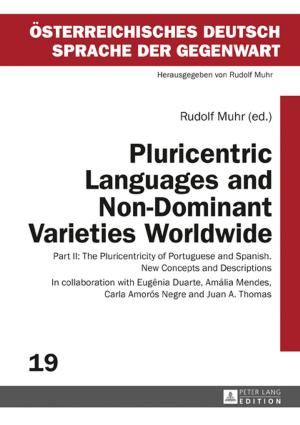Citizenship in a Transnational Canada
Nonfiction, Social & Cultural Studies, Social Science, Demography, Business & Finance, Business Reference, Government & Business, Political Science| Author: | Augie Fleras | ISBN: | 9781433149986 |
| Publisher: | Peter Lang | Publication: | November 9, 2018 |
| Imprint: | Peter Lang Inc., International Academic Publishers | Language: | English |
| Author: | Augie Fleras |
| ISBN: | 9781433149986 |
| Publisher: | Peter Lang |
| Publication: | November 9, 2018 |
| Imprint: | Peter Lang Inc., International Academic Publishers |
| Language: | English |
Citizenship in a Transnational Canada offers a distinct look at the prospect of rethinking citizenship in a contested world of shifting narratives, evolving models, ongoing challenges, and future possibilities. The book’s central theme embodies a critical awareness that we no longer live in a national citizenship world but rather in one reorganized around the emergent realities, discourses, and practices of a postcitizenship world that is reshaping how we think, talk, and do citizenship. A new vocabulary is thus required for thinking, talking, and doing citizenship if there is any hope of formulating a narrative consistent with a world of posts, trans, and isms.
The book is also premised on the assumption that the citizenship concept is experiencing an identity crisis ("what it is?") and a crisis of confidence ("what should it be doing?") in an increasingly diverse, changing, and complex world, disenchanted with the certainties of the past although unsure of what lies in store. New citizenship narratives and practices are emerging that not only challenge the conventional citizenship model of a single nation-state within a territorially bounded framework but also capitalize on the complexities of transmigrant identities across a networked web of transnational linkages, postnational realities, and a postmulticultural world of diverse-diversities. No less salient are the postcolonial politics that accompany the politicization of Indigenous peoples’ citizenship arrangements commensurate with their constitutional status as "the (de facto) sovereigns within."
The paradoxes and possibilities that accompany the conceptual makeover of national citizenship regimes along "postcitizenship" lines are explored as well across the settler domains of Canada and (to a lesser extent) the United States, Aotearoa/New Zealand, and Australia.
Citizenship in a Transnational Canada offers a distinct look at the prospect of rethinking citizenship in a contested world of shifting narratives, evolving models, ongoing challenges, and future possibilities. The book’s central theme embodies a critical awareness that we no longer live in a national citizenship world but rather in one reorganized around the emergent realities, discourses, and practices of a postcitizenship world that is reshaping how we think, talk, and do citizenship. A new vocabulary is thus required for thinking, talking, and doing citizenship if there is any hope of formulating a narrative consistent with a world of posts, trans, and isms.
The book is also premised on the assumption that the citizenship concept is experiencing an identity crisis ("what it is?") and a crisis of confidence ("what should it be doing?") in an increasingly diverse, changing, and complex world, disenchanted with the certainties of the past although unsure of what lies in store. New citizenship narratives and practices are emerging that not only challenge the conventional citizenship model of a single nation-state within a territorially bounded framework but also capitalize on the complexities of transmigrant identities across a networked web of transnational linkages, postnational realities, and a postmulticultural world of diverse-diversities. No less salient are the postcolonial politics that accompany the politicization of Indigenous peoples’ citizenship arrangements commensurate with their constitutional status as "the (de facto) sovereigns within."
The paradoxes and possibilities that accompany the conceptual makeover of national citizenship regimes along "postcitizenship" lines are explored as well across the settler domains of Canada and (to a lesser extent) the United States, Aotearoa/New Zealand, and Australia.















